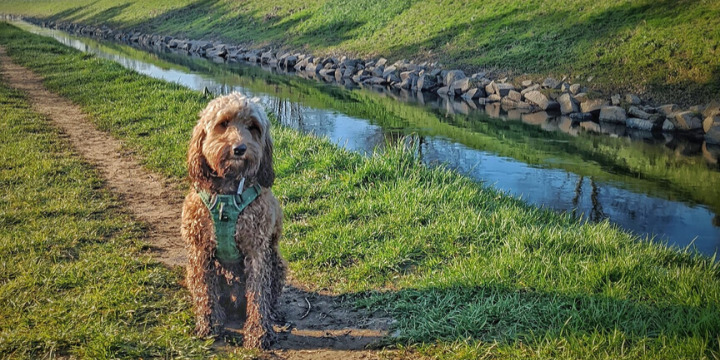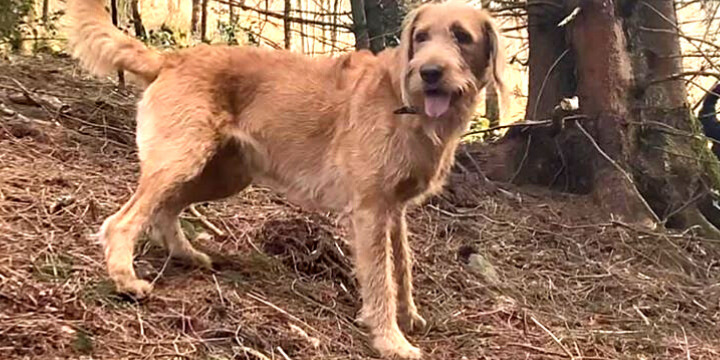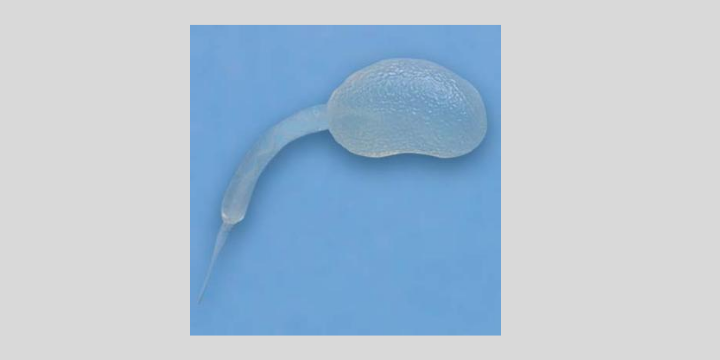The decision to neuter Freya three months after her first season, was made solely on the advice of my vet, Dan. Having never had a dog, and after fully researching the subject in 2017, I could find no definitive answer as to when was the best time to neuter a female or male dog, and so I relied fully on Dan’s experience and expertise.

Then in July 2020, Frontiers in Veterinary Science published data from a study of 35 breeds – along with three varieties of Poodles – spanning 15 years. This now gives us a much fuller picture and enables both professionals and dog owners to make more in-depth decisions.
What is neutering?
“Neutering is the general term used for the surgical removal of the reproductive organs in both male and female dogs. Castration is the removal of the testicles of the male dog. Spaying is the removal of the ovaries and uterus of the female dog.” The Dogs’ Trust
Castrating a male dog means the complete removal of a dog’s testicles (orchiectomy) under general anaesthetic. An incision is made just in front of the scrotal sac and both testicles are removed; the sac remains intact. It prevents the production of sperm, and greatly reduces the production of the male hormone testosterone.
Spaying (ovariohysterectomy) a female dog is also performed under general anaesthetic through an incision made in her abdomen and then removing the uterus and both ovaries. It can also be performed as a laparoscopic operation, usually carried out in larger breeds.
Having listened to several owners of male poodle cross breeds agonising over the decision as to when to castrate their dogs, I asked three to tell their personal stories. Mainly because, prior to Frontiers in Veterinary Science recent study, there was little scientific based evidence, it was mainly conjecture and personal opinion.

Columbo the Cockapoo’s story
Current Age: 21 months, early castration
“Columbo had his castration operation at around six and a half months old and it wasn’t an easy decision to make at all. Advice across the Internet varies hugely and contradicts one another indefinitely. Too early and your puppy won’t develop into adulthood properly, too late and the health benefits such as cancer risk factors for later life diminish.
Our vet practice neuters male puppies from six months old, but I’ve heard of some that carry out the operation from four months; some breeders do it even earlier before you collect the puppy! We trusted that if the veterinary surgeon was willing to perform the operation at that age, it wasn’t detrimental to the puppy’s health and development, after all vets do have your pet’s health and wellbeing at the forefront, just like doctors.
The key decision factor for us was to make sure we were scheduling the operation at a time that was right for us as a family – a time when we were ready for the disruption it brings and could comfort Columbo through the discomfort.
Columbo’s operation and recovery went really well; seven days following the operation he was completely back to his usual self and the wound was practically healed. Ten days on it was looking even better.
We noticed some positive changes in Columbo’s behaviour. No longer was he displaying dominating behaviour when excited and his appetite increased, which was great as he was a slow eater. It was challenging to get him to eat all his food all the time, whereas he began to eat at scheduled times and all his food.
I don’t think it had an impact on his development, and he continued to grow. I found some pro-early neutering articles that said, although testosterone production is reduced, it’s not their only source of testosterone.
So long has passed now and Columbo’s developed his own personality which he’d presumably have done regardless of whether he was neutered or not…who knows if he’d be a different dog if he wasn’t! He still goes through phases of humping (especially if I leave my coat on the back of the chair!) but I think it’s more attention seeking than anything else.
I think my key bit of advice is if you are going to have your dog neutered, do it at a time that’s right for your family.” Scott

Finn the Labradoodle’s Story
Current Age: Eighteen months, chemical castration, intact male
“Finn had a chemical castration because I wanted to see what effect it would have on him before I decided on something permanent. It’s so brilliant, especially for nervous dogs who could easily get worse with neutering. Also, in cases where it’s unclear if a behaviour is sexually motivated, I believe it’s a much better option than take them off and hope for the best. It’s not painful, just like having a microchip!
Dog owners should be aware that many vets have never done chemical castration before and also that it’s way way way cheaper to buy it online, but it must be kept refrigerated so I took it to the vet in a freezer bag with freezer packs!
I bought the implant online through Viovet; there’s only one on the market so far so there’s no choice. The only downside is Viovet come in packs of two, currently priced at £147.49, so it’s quite expensive, but so so so worth it from a behaviourist point of view. However, having a two pack of implants means that either two people could share the cost and do six months each, or cover a whole year. Also my vet only charged me half a consultation fee to whack it in. Worth an ask!
Ideally, I would have neutered Finn after two but he’s a raging puddle of testosterone and is clearly anxious about all the super naughty things he is now highly motivated to do. So for his emotional well-being and roaming I’m going to do it as soon as possible. I’ll use the second implant then go for the op before it wears off.
We don’t know whether the chemical implant has the same effect as neutering in increased risk of arthritis, age-related cognitive difficulties, etc, but the vet presumes it does. This means I effectively neutered Finn at 11 months, which is far from ideal physically, but better for his welfare over all. With lockdown, he couldn’t have the second one so he’s had a temporary boost of testosterone, which I’m actually glad about (even though he’s hard to manage behaviourally) because physically he’ll mature a bit more.
Opinion as to what’s best is really woolly; I’ve come to the conclusion that you should do what’s best for you! However, even though population control is less of an issue in the UK, it’s still a huge issue and the number one reason pets should be neutered. We desperately need to reform breeding practices (specifically breeding for looks, not paying much regard to temperament and welfare standards) and there are so many rescue dogs needing homes.” Rachel

Mylo the Cockapoo’s Story
Current Age: Two and a half, intact male
“I adopted Mylo when he was two months old. My intention, based on my dog-experienced family members and friends, was to have him castrated at the earliest opportunity. After all, based on my ‘experienced’ nearest and dearest, it would lead to a calmer and better behaved dog. So many people had told me this – so it had to be true, right?
Then Mylo and I attended puppy classes and the seeds of doubt were sown. Our first dog trainer explained that this was a widely held fallacy and that early castration could leave me with an emotionally immature and nervous dog. My second, followed by my third dog trainer (we’ve had a few) said the same thing.
Meanwhile, my vet advised against early castration until Mylo was fully grown to ensure optimum musculoskeletal and emotional maturity (unless he was being sexually inappropriate), but to balance this with an increasing risk of testicular cancer as he got older. With my medical background, I could fully identify with this view and felt it was totally rational. However, well-meaning fellow dog owners were putting increasing pressure on me to have Mylo castrated as soon as possible, even at times making me feel like a bad doggy parent, because it was “the done thing” and “it will calm him down” and the best of all “I know as I’ve had dogs all my life”.
Conversely, a couple of doggy parents seemed baffled as to why their previously nervous dog had not calmed down at all, but had in fact become even more nervous! So Mylo was at times boisterous and occasionally play-bonked, but never aggressive, inappropriate or sex-focussed. So I followed the advice of the professionals and resisted the pressure to concede.
Mylo has had a period of nervousness with other dogs, precipitated by an unprovoked attack by a neutered dog that was off lead. After this, he lost trust in other dogs which is not surprising. So we met up with Dave, a lovely local dog behaviourist who we were working with pre-lockdown. He also advised against castration until after Mylo had regained his confidence and trust. Dave felt Mylo needed to mature a little more emotionally and, on that front, it was not the right time to castrate him.
Animal behaviourist, Rachel Leather, also gave us some excellent advice, most of which concurred with Dave’s. She also taught me techniques to help Mylo feel safe again.
Mylo has learned to trust other dogs once more – without the need for castration. He remains boisterous, but much less so now that he is older; he’s very affectionate and no longer bothered about bonking. However, I will get him castrated. Most likely after his third birthday!” Toni

Neuticles
Yes you heard it right! In 2005, Greg Miller won the Ig Nobel Prize in Medicine – a parody of the real Nobel Prize – for the invention of Neuticles. These are polypropylene or silicone prosthetic testicular implants for neutered dogs and other animals. The first commercial Neuticles were implanted in 1995.
Kim Kardashian’s dog, Rocky, was given Neuticles on the reality television show Keeping Up with the Kardasshians.
In the UK, the regulatory body for veterinarians, the Royal College of Veterinary Surgeons, states that the use of any form of cosmetic surgery is unethical.